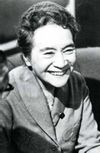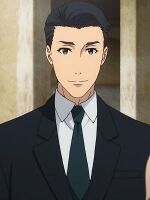President of Akashi
| President of Akashi | |
|---|---|
 | |
| Style | President |
| Residence | The President's Residence |
| Seat | Hirakawa, Kagi, Akashi |
| Appointer | Popular vote |
| Term length | Five years Renewable indefinitely |
| Constituting instrument | Constitution of Akashi |
| Formation | 1 January 1900 |
| Website | http://www.daitoryo.go.aks/ |
The President of Akashi (Miranian: 大統領 Daitōryō; Gothic: 𐍂𐌴𐌹ᚴ𐌹𐍆𐌰𐌸𐍃 Reikifaþs) is the head of state of Akashi. The President is directly elected, and acts largely as a ceremonial figurehead with no executive power.
Election
The President is elected in direct elections held every five years. Presidential elections use a two-round system: if no candidate receives an absolute majority (more than 50%) of the votes cast in the first round, the top two candidates proceed to a runoff.
Presidential elections are held on the last Saturday in June, simultaneously with other elections. If necessary, runoffs are held a week later.
Once elected, the President's party membership is automatically suspended for their term in office, and they cannot hold any other offices or occupations.
Inauguration
The President is inaugurated in the presence of the members of the Supreme Court. They take the affirmation of office in Miranian and Gothic:
- I solemnly and sincerely affirm and declare that I will respect the Constitution and laws, and always serve the general interest of the Akashian people.
The President is not allowed to deviate from the text of the affirmation.
Succession
In the event of a vacancy of office, the National Assembly names an interim president until a snap election is held.
Role
The President's role is mostly ceremonial. They represent the unity and continuity of the state, and oversee the norms and conduct of day-to-day politics. They ceremonially represent Akashi in international relations, and are the commander in chief of the Akashian National Armed Forces.
Most presidential acts are done at the instruction of the cabinet. The President officially promulgates laws approved by the National Assembly, and can enact decrees proposed by the government, which expire automatically after 30 days. The President can refuse to sign a bill if they believe it unconstitutional or improperly passed. The bill is then returned to the legislature, which may amend it, withdraw it, or pass it without any changes.
The President formally dissolves legislatures and calls elections, both locally and nationally. Following a general election, they designate the Prime Minister and ask them to form a government.
The President appoints and swears in judges, civil servants, and military officers at the national level. They grant pardons and commutations, and award decorations and honours, with the advice and consent of the government.
Amenities
The President's official residence is The President's Residence (大統領官邸 Daitōryō Kantei; 𐍂𐌴𐌹ᚴ𐌹𐍆𐌰𐌳𐌴 𐍂𐌰𐌶𐌽 Reikifadē Razn), in Hirakawa.
They usually take a holiday during the summer prorogation, briefer leave during the New Year season, and are entitled to parental leave.
The President has transportation and security services at their disposal at all times. They can be transported within Akashi and abroad by specially modified aircraft from the Akashi National Air Force.
List of Presidents of Akashi
| Portrait | Name (Birth–Death) |
Term of office | Election | Political party (Nominating) |
Prime Ministers | ||
|---|---|---|---|---|---|---|---|

|
Yurika Ehara 友里花 江原 (1905–1989) |
15 January 1940 |
1 September 1980 |
1940 1945 1950 1955 1960 1965 1970 1975 |
National Union | Herself Masaki Ōshiro Tarō Yukimura Kasumi Kuroki Naoko Nemoto Yumiko Nagatsuki Hikaru Katayama | |

|
Masako Nakai 雅子 中井 (1921–1993) |
1 September 1980 |
1 September 1985 |
1980 | Independent | Toshirō Kuno Mutsuhito Ōe Þiudawulþus Ran Tsukuda | |

|
Emi Hanamura 笑 花村 (1950–) |
1 September 1985 |
1 September 2000 |
1985 1990 1995 |
United Akashi | Ran Tsukuda Ichirō Kondō Shinobu Furukawa | |
| Moderate People's Party | |||||||

|
Kōsaku Ayuzawa 功作 鮎沢 (1945–) |
1 September 2000 |
1 September 2010 |
2000 2005 |
Socialist Party | Ran Tsukuda Anna Carbone | |

|
Kyōichi Hirayama 京一 平山 (1970–) |
1 September 2010 |
Incumbent | 2010 2015 |
Socialist Party | Kōko Kaga | |

